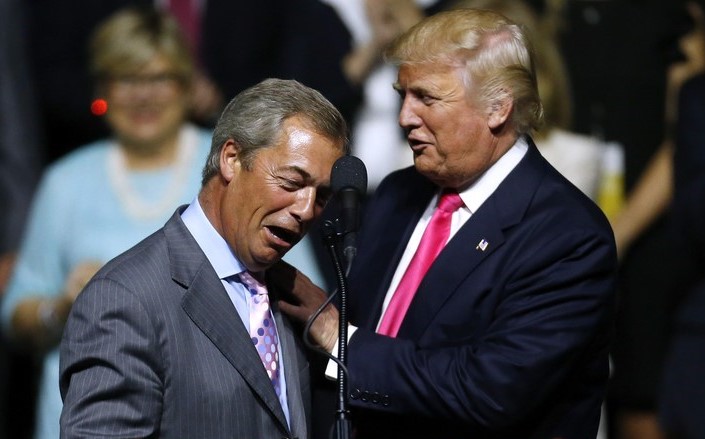AFP photo
By
Tom Arms
Backgrounder: This week the world’s premier lexicon—The Oxford English Dictionary—named post-truth as word of the year. This article imagines the Hollywood-style awards ceremony.
Commentator: Ladies and gentlemen, London’s Royal Albert Hall is packed for this year’s Oxford English Dictionary words of the year presentations. There is no finer setting than this grand Victorian edifice on the edge of Hyde Park. So far we have heard awards for comic word of the year, short word of the year and long word of the year.
We are now approaching the announcement of the evening—the Oxford English Dictionary word of the year. The crowd of the world’s most famous wordsmiths—politicians, journalists, broadcasters and communicators of all shades and opinions—are decked out in their finest and anxiously waiting to hear the word that has shaped this most momentous of years.
And the moment has come. Emerging from the wings and stepping up to the podium is our host and a young Oxford student bearing the famous imperial blue envelopes.
Host: Ladies and Gentlemen, it is with both pride and humility that I stand here with this lovely young lady on the verge of presenting the Oxford English Dictionary’s Word of the Year Award. The ability to communicate through the written and spoken word is a key attribute separating us from the animals. It is the channel through which moves statements of love, hate, fear, ideas, concepts, and scientific discoveries which move our world forward. Words are the building blocks of our past, present and future. Words and the meanings they convey are at the very foundation of society. The Word of the Year is—according to the editors of the Oxford English Dictionary—the word that best represents the thoughts and deeds of the past 12 months and acts as a pointer to the future.
Commentator: (whispers) Total silence as the host opens the first envelope with the solid gold letter opener embossed with the Oxford University coat of arms.
Host: And the nominations are:
Brexit – The act of British withdrawal from the European Union,
Alt-right – an ideological grouping associated with extreme conservative or reactionary viewpoints, characterized by a rejection of mainstream politics and by the use of online media to disseminate deliberately controversial content,
And finally, Post-truth – relating to or denoting circumstances in which objective facts are less influential in shaping public opinion than appeals to emotion and personal belief.
And the winner is…
Commentator: The host is now opening the second imperial blue envelope. He is arching his eyebrows slightly and…
Host: Post-truth.
Commentator: Well ladies and gentlemen, just listen to that rapturous applause. You can tell that the OED’s word of the year is a top-notch popular choice. British Prime Minister Theresa May and all the members of the Trump family are applauding enthusiastically. Chinese President Xi-Jinping is smiling enigmatically from ear to ear.
Making their way to the stage to receive the award are Donald Trump and his alt-right eminence grise and now White House Chief Strategist Steve Bannon. Also wending their way through the crowd are Nigel Farage and Boris Johnson, the men who persuaded British voters that it was possible to leave the European Union, stop immigration and still retain all the financial benefits of membership of the European Club.
Finally, from the back of the hall, the crowds are parting for the man whom most think is the biggest winner in this battle of words. Yes, Vladimir Putin, the Russian President who successfully denied sending Russian soldiers into Eastern Ukraine. Denied shooting down a Dutch airliner. Denied bombing aid convoys to Aleppo and denied killing thousands of innocent men women and children with his indiscriminate bombing campaign.
The host is smiling and shaking each of the men’s hands. The gold trophy pen engraved with the motto: “Words Shall Set You Free,” is being handed to President Putin. He is holding it aloft now. This is when his fitness training pays off.
Host: Gentlemen the stage is yours.
A grizzled Steve Bannon raises his fist and shouts: “The future belongs to us.”
Tom Arms is a broadcaster and columnist focused on world affairs. His regular wold affairs podcast can be heard at www.lookaheadnews.com. He is also available for lectures and speaking engagements.
LookAhead Radio World Report for week commencing 21 November:



1600 Hundred Pennsylvania Avenue - Poem by Is It Poetry How much farther must we go, to reach the land of sex and money. The wasp's and bee's, hurry move and buzz about my head. The crows land and watch and sit upon a iron planted fence. That stretches round my pointed head. Dragonfly's, upon the roof that spit fire, consume U.S. all who disagree. Dragging my body through the halls of guilded bribery. Their golden chain is stretched out of reach of my weak will. To my shame and great pleasure, the second lady, took her silk panties off and sat upon my face and takes a pee. So close to me it is, that I can see her lip's. They pump out all my blood and replace it with their sour wine. One tries to jerk me off and I just suck it up back inside just out of reach of prying eyes, behind the presidential paintings on the pearl white walls. A dynasty of broken doll's, look down from shelves, porcelain little arrows, that have pierced all their broken heart's, now deaf and mute. How much farther is it? Scream the children in the car, here on vaction. There is mud on all their feet, Thick, red and lumpy. It is the thick red clay that they've brought up, from God knows where. How much farther is it, to that house upon a lawn, where dog's like mine, laid out in state are buried.. 1600 hundred Pennsylvania Avenue. I ask a cop he say's, turn left, then take a right, It's over there it's surrounded and sits a way's out back, next to the swamp. Is It Poetry